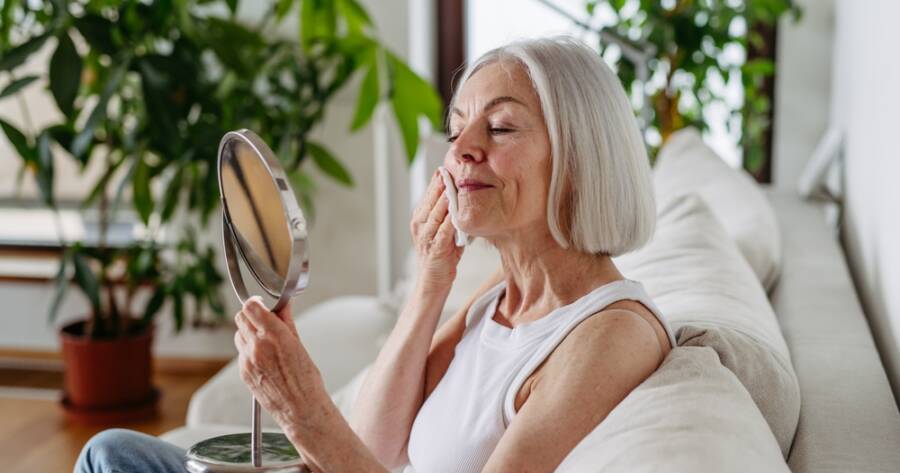Menopause brings changes to the skin that require specialized care. Tailored skincare solutions can help address dryness, sensitivity, and loss of elasticity, keeping skin healthy and radiant. Discover effective ways to adapt your routine to meet these unique needs.
How Menopause Affects the Skin
Menopause can significantly impact the skin due to hormonal changes, particularly the decline in estrogen levels. Estrogen plays a crucial role in maintaining skin hydration, elasticity, and thickness. As estrogen levels drop, the skin can become drier, thinner, and more prone to irritation and sensitivity. Collagen production also decreases, leading to a loss of firmness and the formation of fine lines and wrinkles.1
Reduced estrogen may also affect the skin’s natural oil production, causing the skin to become dull and more susceptible to environmental damage. These changes often result in increased sensitivity to skincare products, requiring gentler formulations. Understanding these shifts is key to adjusting your skincare routine to address these specific needs. By recognizing how menopause affects the skin, you can better choose products and practices that help maintain a healthy, youthful appearance during this transitional phase.
Tailored Skincare Tips for Menopausal Skin
Adjusting your skincare routine during menopause is essential to address the unique changes your skin experiences. Start by incorporating a gentle, hydrating cleanser to avoid stripping the skin of its natural oils. Follow up with a rich moisturizer containing hyaluronic acid and ceramides to lock in moisture and restore the skin barrier. Consider adding a serum with vitamin C to boost collagen production and combat the effects of aging.
Sunscreen also remains a critical part of daily skincare to protect thinning skin from harmful UV rays. Incorporating products with peptides and retinoids can help improve skin elasticity and reduce the appearance of fine lines. Regular exfoliation with a mild exfoliant can promote cell turnover and reveal brighter, smoother skin. Finally, avoid harsh chemicals and fragrances that may irritate sensitive skin. These tailored skincare tips can help keep your skin healthy and vibrant during menopause.2
Choosing the Right Skincare Products for Menopause
Choosing the right skincare products during menopause is crucial to managing changes like dryness, sensitivity, and loss of firmness. Look for products specifically formulated for mature or sensitive skin, as these tend to have gentler ingredients and focus on hydration and barrier protection. Moisturizers with ceramides, hyaluronic acid, and shea butter can provide deep hydration and help repair the skin’s natural barrier. Antioxidants like vitamin C and E are also beneficial for protecting against environmental damage and promoting collagen production.
Further, consider serums or creams with retinol or peptides to help reduce the appearance of fine lines and wrinkles. Always opt for broad-spectrum sunscreen with an SPF of 30 or higher to protect against sun damage. Patch test new products to avoid irritation and gradually introduce them into your routine to find the best fit for your skin’s changing needs.
Learn More About Menopause Skin Care Solutions
Understanding menopause skin care solutions is essential for maintaining healthy and radiant skin during this phase of life. By choosing products that address specific concerns like dryness, sensitivity, and loss of elasticity, you can effectively manage the changes that come with menopause. Tailoring your skincare routine to your unique needs helps to maintain skin health and boost confidence. Learn more about the best products and practices to keep your skin looking and feeling its best through menopause and beyond.
